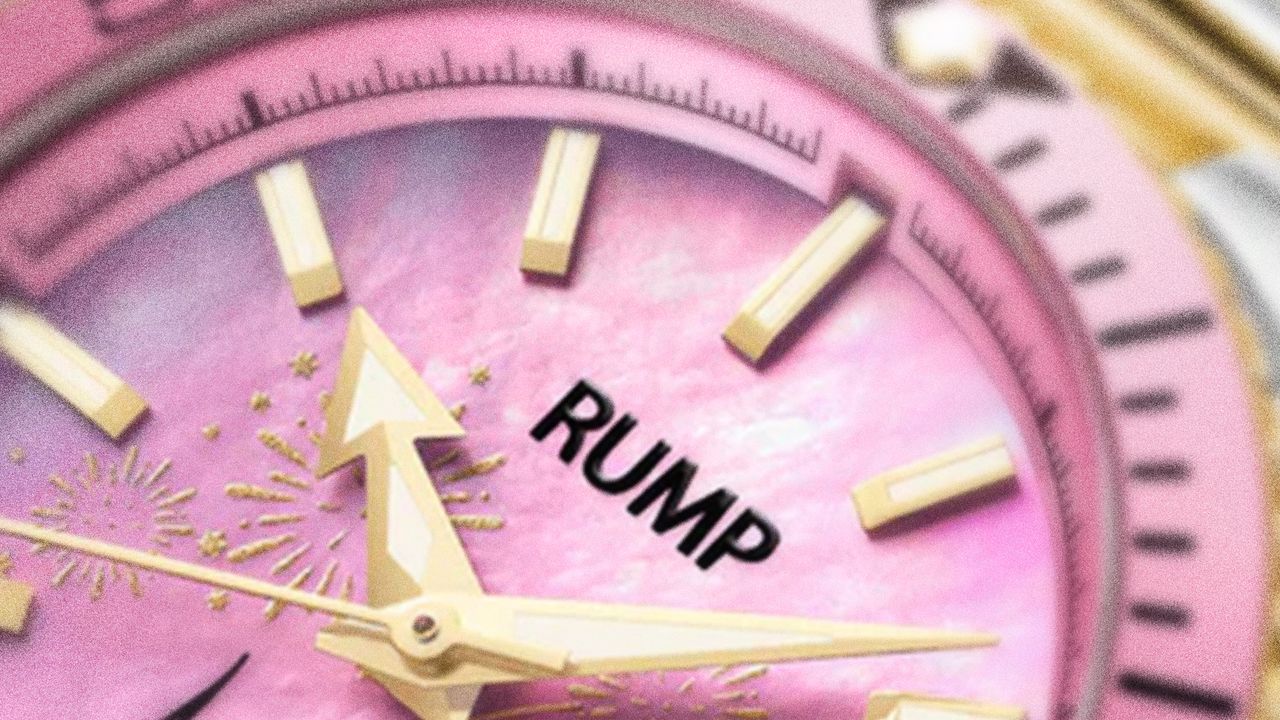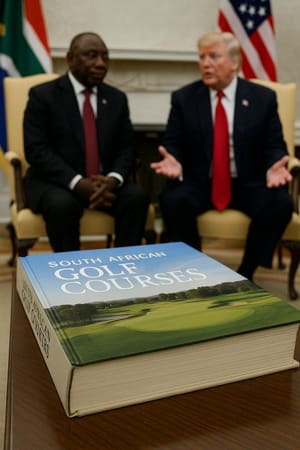In the end, they both came away with a book. The much-heralded confrontation between SA President Cyril Ramaphosa and US President Donald Trump, which one US diplomat anticipated would be an “unmitigated disaster”, ended up being a fairly even match.
It was absorbing, instructive, and oddly mesmerising. It was tense, too, but much more polite than I expected. The event wasn’t short on theatrics: Trump ambushed Ramaphosa with recordings of the EFF's Julius Malema’s “kill the boer” antics; in turn, Ramaphosa ambushed Trump with SA’s golfers. (Well .. that’s not exactly true: bringing Ernie Els and Retief Goosen was Trump’s idea, as a kind of nod to the fact that they helped set up the meeting.)
Still, you could say that Ramaphosa chipped out of Trump’s bunker. From Ramaphosa’s point of view, emerging from the meeting with a few diplomatic niceties constitutes a narrow kind of victory in the circumstances of the recent diplomatic fallout. As one of my colleagues pointed out, Ukrainian President Volodymyr Zelenskyy must be disappointed in retrospect that his country didn’t have a few US Open winners on hand to help bring down the temperature.
To me, the crucial moment was when Trump was asked what it would take to convince him that there was no white genocide in SA. What then happened was truly remarkable: Ramaphosa interjected that he would answer the question for Trump - a truly inspired intervention. And, with surprising grace, Trump welcomed the intervention.
Ramaphosa went on to flaunt SA’s golfers, making the excellent point that they would hardly be present if there were a “white genocide” taking place, and that he trusted Trump would believe their version of what was happening on the ground in SA.
In that moment, an odd thought struck me: seeing them sitting together, batting away the media’s fastballs and curved balls, juggling the mic so adeptly, it hit home not how different they are but how similar. In so many ways, Trump and Ramaphosa are peas in a pod.
The idea originated from a British friend who suggested that, behind the scenes, Trump and Ramaphosa probably got on famously. “After all, they share the same confusion about the distinction between what is public money and private benefit”.
As the thought sprouted, the similarities became all the more clear. Both are an odd variety of business people, whose actual business acumen is somewhat dubious. Trump inherited much of his wealth, and Ramaphosa reaped his through BEE deals.
It's not that they were deficient or passive. Both have been adept in the process and have taken full advantage of their bequests, which is a skill in itself. But much of their misunderstandings about the nature of business can be traced back to their incomplete knowledge of the broader subtleties of commerce, which may be connected to their own faux involvement in business. Entrepreneurs they are not, which suggests why they are so attracted to actual entrepreneurs.
And on the subject of details, I can’t say I know either but what is painfully apparent is that neither are strong on the boring stuff, particularly of complex policy design. They are very a-tuned to the politics, and very not a-tuned to, say, the complexity of economics. I thought it was revealing that Ramaphosa complimented Trump on his redesign of the Oval Office. He seemed genuinely impressed. All that gold. What could be more tasteful?
The fact is that both Trump and Ramaphosa worship extreme displays of wealth. In Ramaphosa’s case, it's private game farms with sofas stuffed with dollars; in Trump’s case, it's the opulent extravagance that is Mar-a-Lago. There is a quality of theatre about them. And you don’t even need to reach particularly deep into your amateur psychology textbook to guess that they are both compensating here.
Whatever you think about their politics, they have one really extraordinary skill in common: they are adept communicators, each with an uncanny ability to know exactly which buttons to push. It's that ability to confidently pull off public interactions that makes them both such successful politicians.
They do have different styles: Trump is often brash, confrontational, and his rhetoric is divisive. Ramaphosa defaults to a kind of reserved diplomacy. But both approaches are driven, I suspect, by their circumstances, with Trump’s communication skills honed in reality television, and Ramaphosa’s as a trade union and political negotiator. They are, after all, operating in massively different circumstances. Yet, they share an instinctive sense of how to capture the public mind, which helps explain their political prominence, which in both cases, has lasted for very long periods.
Their worst traits reveal where they are most similar too: how intimately woven they are into their core constituencies. And that also explains the chief cause of their conflict.
Trump’s embrace of the idea of white oppression and the targeting of Afrikaner farmers in SA is, fairly transparently, a kind of unacknowledged nod at his largely white, male, rural base. Ramaphosa’s lack of action against the “kill the boer” antics of the EFF and his championing of the expropriation without compensation legislation is a kind of unacknowledged nod at his largely black, male, rural base.
They are such perfect mirrors of each other, not only because of their circumstances but because both recognise something deeper: the enormous power of a sense of victimhood. And in both cases, the facts of the situation are comparatively trivial to its symbolism.
Understandably, a large portion of the SA media and commentariat plead “the facts”: no land has been expropriated without compensation; no targeted “genocide” of white farmers is taking place. All true, of course. But also irrelevant. The facts are not germane here; the sense of the facts within the core constituencies is the thing.
So, back to those books. Ramaphosa said Trump had given him a book without releasing specific details about its title or content. He did mention the book he gave to Trump: a substantial, 14-kilogram coffee-table book showcasing South Africa's golf courses.
It is just possible to be a little cynical here: As Daily Show presenter Ronny Chieng quipped, Ramaphosa, in his view, really messed that up. “You lost him at ‘book’ and you definitely lost him at ‘kilograms’,” he said. But Ramaphosa said at a briefing afterwards, ‘In the end, we had a really good bilateral’.
And you know, I think he actually meant it. And had reason to mean it. 💥
From the department of "so close" ...

From the department of "have you updated your LinkedIn profile"?...

From the department of advanced, but brief, alchemy ...

Thanks for reading - please do share if you have a friend (or enemy!) you think would value this blog and ask them to add their email in the block below - it's free for the time being. If the sign-up link doesn't appear, you'll find it on the site.
Till next time. 💥






Join the conversation